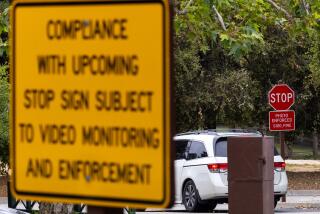Judge Guilty in Fixing of Son’s Parking Fines
- Share via
A veteran Beverly Hills Municipal Court judge was found guilty Tuesday of conspiring to obstruct justice by improperly suspending the fines on more than 200 parking tickets issued to automobiles driven by the jurist’s son and the youth’s friends.
“We really soul searched and we did a . . . good job of trying to find him not guilty. But there was no alternative,” said Donald Small, 28, the foreman of the Beverly Hills Municipal Court jury that deliberated for 2 1/2 days before finding Judge Charles D. Boags guilty of the misdemeanor offense.
“Public officials must be accountable for what they’re doing,” Small said.
Boags was impassive as the verdict was read. But the judge’s son, Martin R. Boags, who is on leave from the U.S. Air Force Academy, clutched his head in his hands as he slumped in his seat in the front row of the spectators’ gallery.
The judge did not speak to reporters. However, Richard G. Hirsch, one of Boags’ attorneys, said, “Obviously we’re all disappointed with the verdict. We have felt right along, and still feel, that Judge Boags committed no crime. We will appeal this verdict.”
Hirsch’s co-counsel, Johnnie L. Cochran Jr., added: “We see this as a setback, a serious setback obviously. But (it is) the first step along the way and we expect that he (Boags) will ultimately be vindicated. We feel strongly about that.”
Under California law, Judge Carlos Baker Jr., who presided, could sentence Boags to up to one year in jail. Deputy Dist. Atty. Lawrence Mason, who on Tuesday stood in for the prosecutor, said his office has not yet decided what punishment it will request when Boags is sentenced Feb. 10.
Boags served for 20 years as a Los Angeles County deputy public defender before he was appointed to the bench in 1979 by then-Governor Edmund G. Brown Jr. He has twice been reelected.
During the four-week conspiracy trial, Deputy Dist. Atty. Richard Healey sought to persuade jurors that Boags and his son had entered into an informal but clearly understood agreement under which Martin Boags handed over to his father parking tickets with the understanding that the judge would suspend the fines. To prove a conspiracy, the prosecution must prove the existence of some type of agreement to subvert the law.
Healey introduced into evidence 205 parking tickets, initialed by Boags, on which the judge had recorded guilty pleas and suspended the fines. One hundred forty-five of the tickets were issued to a car registered to the judge himself and driven by his son to Beverly Hills High School. The tickets were issued in 1984, 1985 and 1986.
Members of the Team
Healey argued that Martin Boags and his friends, several of whom were fellow members of the high school’s football team, received special treatment, not only because their fines were always suspended, but because they were not required to appear in court.
“These tickets were being passed across the breakfast table,” Healey told the jurors in his closing argument. “The judge had the right to suspend the fines. That’s true. But he did not have the right to enter into an agreement beforehand . . . ‘Give me the tickets, Marty, you’re going to get your fine suspended.’ ”
Healey conceded that he had no direct evidence of the agreement, and noted that Martin Boags had testified that he did not know what the disposition would be when he handed the parking tickets to his father. But the prosecutor told the jurors that they could infer that the agreement existed, because the judge never imposed a fine.
“That was our biggest hang-up right there, the agreement,” Small said. “We really soul searched and tried to find alternatives to where there wouldn’t be an agreement and we just couldn’t find it.”
The jury foreman said a key factor was a conflict between the testimony of Martin Boags, who testified that he did not know what would happen to the tickets, and the testimony of a friend, whose ticket was fixed, that the younger Boags had told him how the citation would be handled, Small said.
The jury earlier Tuesday had reported that it had reached an impasse. But after Martin Boags’ testimony was re-read, the panel reached a verdict.
Cochran had argued that the judge is an honest man who erred ethically by failing to disqualify himself from handling his son’s tickets.
Among the 18 defense witnesses were two Superior Court judges and a senior Los Angeles County prosecutor, who attested to Boags’ honesty and integrity. The judge did not testify in his own behalf.
Cochran told jurors that court officials established through their testimony that parking tickets are handled with leniency by most Beverly Hills judges because of the severe parking problems in the community, especially in the neighborhood of the high school.
Outside court Tuesday, Cochran said a central issue of an appeal will be Judge Baker’s failure to allow expert witnesses to testify that sentencing is a matter that the law leaves solely to a judge’s discretion.
The charges against Boags were filed in January, 1987, nine months after The Times disclosed that the judge had engaged in a pattern of suspending fines for his son and the young man’s friends.
At the time, Dist. Atty. Ira Reiner said, “What Judge Boags was doing, stripped down to its essentials, was fixing tickets for his son and fixing tickets for his son’s friends. . . .”
More to Read
Sign up for Essential California
The most important California stories and recommendations in your inbox every morning.
You may occasionally receive promotional content from the Los Angeles Times.













